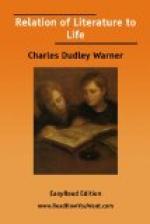What we call life is divided into occupations and interest, and the horizons of mankind are bounded by them. It happens naturally enough, therefore, that there should be a want of sympathy in regard to these pursuits among men, the politician despising the scholar, and the scholar looking down upon the politician, and the man of affairs, the man of industries, not caring to conceal his contempt for both the others. And still more reasonable does the division appear between all the world which is devoted to material life, and the few who live in and for the expression of thought and emotion. It is a pity that this should be so, for it can be shown that life would not be worth living divorced from the gracious and ennobling influence of literature, and that literature suffers atrophy when it does not concern itself with the facts and feelings of men.
If the poet lives in a world apart from the vulgar, the most lenient apprehension of him is that his is a sort of fool’s paradise. One of the most curious features in the relation of literature to life is this, that while poetry, the production of the poet, is as necessary to universal man as the atmosphere, and as acceptable, the poet is regarded with that mingling of compassion and undervaluation, and perhaps awe, which once attached to the weak-minded and insane, and which is sometimes expressed by the term “inspired idiot.” However the poet may have been petted and crowned, however his name may have been diffused among peoples, I doubt not that the popular estimate of him has always been substantially what it is today. And we all know that it is true, true in our individual consciousness, that if a man be known as a poet and nothing else, if his character is sustained by no other achievement than the production of poetry, he suffers in our opinion a loss of respect. And




